PakAlumni Worldwide: The Global Social Network
The Global Social Network
Why Only 10 Nobel Prizes Won By 1.5 Billion Muslims To Date?
Are today's Muslims fratricidal low-achievers? Are Muslims unique in their lack of achievement and propensity for fratricidal violence? Are there other religious and racial groups which share these traits with Muslims?
It has become fashionable among Muslims and non-Muslims alike to bash followers of the Islamic faith for their lack of achievement and propensity for fratricidal violence. Some criticize Muslims for having won only 10 Nobel prizes since the prize was launched in 1901. Others lambaste Muslims for killing each other. Let's examine both of these charges in some detail below:
Muslims as Low Achievers:
Renowned atheist scholar Richard Dawkins has recently disparaged Muslims by pointing out that the entire Muslim world has had fewer Nobels (10) than Cambridge University's Trinity College (32). He is not alone in attacking Muslims for their lack of achievements; I have heard this from many Muslim critics for many years.
What Dawkins and other critics, including well-meaning self-critical Muslims, fail to mention, according to Christian Science Monitor, is the fact that other large (billion-plus) religious, gender and ethnic groups have won even fewer Nobels than ten won by Muslims: Hindus (four), Chinese (eight) and Africans (nine). Or the fact that women have only won 44 Nobel Prizes, compared with 791 for mostly white men.
It is important to note that today's Muslims and other ethnic-religious groups with very few Nobel prizes have grown up under the shadow of colonial and neo-colonial rule which followed the Industrial Revolution and preceded the launch of Nobel prizes in 1901. Going back in history, it was the Industrial Revolution that created technology which led to the ascendance of the West and the colonization of the East. It marked the beginning of a major shift in economic, military and political power from East to West.
Dan Murphy of the Christian Science Monitor explains it as follows:
"Dawkins, as an educated man, should be well aware of the legacy of colonialism and of simple poverty…. When the Nobel Prize was founded in 1901, the vast majority of the world's Muslims lived in countries ruled by foreign powers, and for much of the 20th century Muslims did not have much access to great centres of learning like Cambridge. The ranks of Nobel Prize winners have traditionally been dominated by white, Western men - a reflection of both the economic might of the West in the past century, preferential access to education for that class of people as well as a wonderful intellectual tradition ."
Dawkins' tweet did acknowledge that "they (Muslims) did great things in the middle ages". Clearly, the history of humanity is not just 100 years old. It did not begin with the launch of Nobels in 1901. It stretches much further back. The defining work of Muslims in earlier centuries (8th to 13th century) built the foundation on which modern science and today's Nobel Laureates stand. It included development of decimal number system (still called Arabic numerals), Algebra (Al-Khwarizmi), the concepts of scientific method (Al Biruni) and algorithms (Al Khwarizmi), first camera (Al Haitham), Medicine (Avicenna), first human flight (Ibn Firnas), astrolabe (Al Frazari) etc.
In "Lost Discoveries" by Dick Teresi, the author says, "Clearly, the Arabs served as a conduit, but the math laid on the doorstep of Renaissance Europe cannot be attributed solely to ancient Greece. It incorporates the accomplishments of Sumer, Babylonia, Egypt, India, China and the far reaches of the Medieval Islamic world." Teresi by his description of the work done by Copernicus. Nasir al-Din al-Tusi, a Persian Muslim astronomer and mathematician, developed at least one of Copernicus's theorems, now called The Tusi Couple, three hundred years before Copernicus. Copernicus used the theorem without offering any proof or giving credit to al-Tusi. This was pointed out by Kepler, who looked at Copernicus's work before he developed his own elliptical orbits idea.
A second theorem found in Copernican system, called Urdi lemma, was developed by another Muslim scientist Mu'ayyad al-Din al-Urdi, in 1250. Again, Copernicus neither offered proof nor gave credit to al-Urdi. Columbia University's George Saliba believes Copernicus didn't credit him because Muslims were not popular in 16th century Europe, not unlike the situation today."
Fratricidal Tendencies Among Muslims:
Muslims are killing Muslims, say the critics. This begs the question: Is this something unique among Muslims? Who kills 30,000 Americans each year? Is it not Americans? Who is responsible for the 40,000 reported homicides in India (actuals are likely much higher) every year? Is it not fellow Indians? Mostly Hindus?
Who killed Gandhi? Was it not Nathuram Godse, a fellow Hindu? Who killed Yitzhak Rabin? Was it not Yigal Amir, a fellow Jew? Who killed Abraham Lincoln? Was it not John Wilkes Booth, a fellow American?
The fact is that almost every nation-state has had periods of excessive violence such as civil wars. Fratricidal deaths have accounted for the great bulk of deaths in almost every nation since the beginning of time. Such deaths have occurred in great numbers in almost every society since Adam and Eve's son Cain is alleged to have killed his brother Abel. Every period of great change in human history has been almost always been accompanied by massive violence that Muslims are experiencing now.
Anti-Muslim Bigotry:
Dawkins' comments appear to be motivated by growing anti-Muslim bigotry in the West, especially because he prefaced them by saying "Who the hell do these Muslims think they are?" But the fact that he singled out Muslims for criticism and ignored other groups who have achieved even less seems to indicate that he holds Muslims to a higher standard than others, including Blacks, Chinese and Indians who are almost as numerous. I'd prefer that Muslims see as a challenge rather than be offended by it. At the very least, it signals that Muslims are not being subjected to what George W. Bush once described as "soft bigotry of low expectation".
The Challenge for Muslims:
Are Muslims taking the challenge thrown by Dawkins seriously? The answer is a qualified yes. They are beginning to do it.
Pakistan has had an impressive 50 per cent increase in the number of research publications during just the last two years, going up from 3939 to 6200.
This has been the second highest increase worldwide. SCimago, the world's leading research database, is forecasting that if this research trend from Pakistan continues, then by 2018, Pakistan will move ahead 16 notches in world ranking, from 43 to 27, and for the first time ever, will cross Hong Kong, Singapore and Thailand in Asia, according to a report in The Nation newspaper. Turkey, Iran, Egypt and Malaysia are other Muslim nations which figure prominently on SCimago rankings.
As to the violence, it is likely to continue for a while longer as vast swaths of the Muslim world sort out their differences on fundamental questions of the role of religion in society and government and settle on a model that delivers what the Muslim world needs most: good clean and responsive governance. Fortunately, there are successful models within the Muslim world in countries like Turkey and Malaysia.
Related Links:
Haq's Musings
Obama, Islam and Science
Educational Attainment in India and Pakistan
Biotech and Genomics Advances in Pakistan
Pakistani Students Studying Abroad
Pakistan Manufacturing Tablet PCs
Military's Role in Pakistan's Industrialization
Pakistan's Demographic Dividend
Pakistan's Defense Industry Goes High-Tech
Pakistan Launches UAV Production Line at Kamra
Pakistan Going Mainstream in IT Products
Pakistan Launches 100 Mbps FTTH Access
Pakistan's $2.8 Billion IT Industry
Pakistan's Software Prodigy
Developing Pakistan's Intellectual Capital
Pakistan Graduation Rates Higher Than India's
Pakistan Conducting Research in Antarctica
Pakistani Scientists at CERN
Higher Education Reforms in Pakistan
-
Comment by Riaz Haq on November 12, 2013 at 7:33am
-
Are Muslims more violent than others?
Looking over the last century, the bloodiest in human history, it’s an equally strange argument to make from a Western, Christian-majority nation. As University of Michigan Islam scholar Juan Cole (Informed Comment, 4/23/13) points out, of the more than 100 million war deaths in the 20th century, something less than 2 percent came at the hands of Muslim-majority nations. Most of those dead came in wars where non-Muslim nations played a significant role—such as the Iran/Iraq War, where the United States aided the aggressor Iraq, and the Afghan Civil War, where the Soviet Union was a major military force.
Cole also explains that “murder rates in most of the Muslim world are very low compared to the United States,” which is especially violent for a wealthy nation.http://fair.org/extra-online-articles/a-media-microscope-on-islam-l...
-
Comment by Riaz Haq on February 3, 2014 at 3:46pm
-
Here's a Detroit Free Press piece on Muslim contributions in the United States:
It has been said that ignorance and prejudice go hand in hand. If anyone can prove that statement true, it’s Michigan Republican National Committeeman Dave Agema.
Following a litany of inflammatory questions about the contributions of American Muslims, some lawmakers have amped up calls for his resignation. While publicly renouncing his bigoted views is important, it is also necessary to reject them because they are riddled with falsehoods.
On Facebook last month, Agema shared a widely circulated blog that highlighted the charity work of the Catholic church before asking a series of mocking questions about Muslims. Some included: Have you ever been to a Muslim hospital? Have you heard of a Muslim orchestra? A Muslim marching band? Have you witnessed a Muslim charity? Can you show me one Muslim signature on the Constitution, Declaration of Independence, or Bill of Rights? Have you ever seen a Muslim do anything that contributes positively to the American way of life?
The questions were intended to be rhetorical, with an implicit answer of “no” resounding after each one. Muslims, Agema believed, had not done any of these things. But a closer examination of history proves that Muslims have done many of them. They are an important and integral part of America’s national fabric and contribute in many meaningful ways to its success and growth.
■ American Muslims have a substantial presence in the health care industry. The Islamic Medical Association of North America, one of many such organizations, estimates that there are more than 20,000 Muslim physicians in the United States. Similarly, an analysis of statistics provided by the American Medical Association indicates that 10% of all American physicians are Muslims. While no Islamic hospitals exist in the United States, per se, several Muslim-based health clinics do. And let’s not forget that the hospital itself is not an American invention — it’s an Egyptian one. For that matter, the father of modern surgery wasn’t an American Protestant pioneer, either, but a 10th-Century Muslim physician from Spain, Abu al-Qasim al-Zahrawi.
■ Criticism over the absence of Muslim orchestras in the United States rings hollow, as well. Few orchestras are comprised exclusively of members from one particular faith, and many are organized along ethnic or other lines. The National Arab and New York Arabic Orchestras are two examples of groups whose members include numerous Muslims. Similarly, marching bands are obviously affiliated with high schools or universities, not mosques or churches, and surely Muslim students make up these musical groups, which, as it turns out, trace their roots back to the military bands of the Muslim Ottoman empire. The violin, too, finds its origins within the 10th-Century bowing instruments of Islamic civilization.
■ Muslim charity groups in the United States are too numerous to catalog, though the Bay Area Islamic Networks Group, the UMMA Clinic in Los Angeles, the Chicago-based Inner-City Muslim Action Network and Dearborn’s ACCESS are examples of groups that provide crucial services and empower the underprivileged. In 2013, the Muslim charity Helping Hand for Relief and Development (HHRD) was rated among the top 10 charities in the United States....
http://www.freep.com/article/20140128/OPINION05/301280121/dave-agem...
-
Comment by Riaz Haq on October 2, 2014 at 10:00am
-
ASLAN: Islam doesn't promote violence or peace. Islam is just a religion, and like every religion in the world, it depends on what you bring to it. If you're a violent person, your Islam, your Judaism, your Christianity, your Hinduism is going to be violent. There are Buddhist -- marauding Buddhist monks in Myanmar slaughtering
women and children. Does Buddhism promote violence? Of course not. People are violent or peaceful. And that depends on their politics, their social world, the way that they see their communities, the way they see themselves.
CAMEROTA: So, Reza, you don't think that there's anything more -- there's -- the justice system in Muslim countries you don't think is somehow more primitive or subjugates women more than in other countries?
ASLAN: Did you hear what you just said? You said in Muslim countries.
I just told you that, Indonesia, women are absolutely 100 percent equal to men. In Turkey, they have had more female representatives, more female heads of state in Turkey than we have in the United States.
LEMON: Yes, but in Pakistan...
-------
(CROSSTALK)
ASLAN: Stop saying things like "Muslim countries."
ASLAN: Stoning and mutilation and those barbaric practices should be condemned and criticized by everyone. The actions of individuals and societies and countries like Iran, like Pakistan, like Saudi Arabia must be condemned, because they don't belong in the 21st century.
But to say Muslim countries, as though Pakistan and Turkey are the same, as though Indonesia and Saudi Arabia are the same, as though somehow what is happening in the most extreme forms of these repressive countries, these autocratic countries, is representative of what's happening in every other Muslim country, is, frankly -- and I use this word seriously -- stupid. So let's stop doing that.
LEMON: OK, Reza. Let's -- I want you to listen to Benjamin Netanyahu again. This is actually the one I wanted you to hear. ASLAN: Yes, the ISIS.
(BEGIN VIDEO CLIP)
NETANYAHU: But our hopes and the world's hopes for peace are in danger, because everywhere we look, militant Islam is on the march. It's not militants. It's not Islam. It's militant Islam. And, typically, its first victims are other Muslims, but it spares no one.
(END VIDEO CLIP)
LEMON: He's making a clear distinction there. He says it's not militants, it's not Islam; it's militant Islam. Do you understand his distinction there? Is he correct?
ASLAN: Well, he's correct in talking about militant Islam being a problem.
He is absolutely incorrect in talking about ISIS equaling Hamas. That's just ridiculous. No one takes him seriously when he says things like that. And, frankly, it's precisely why, under his leadership, Israel has become so incredibly isolated from the rest of the global community.
Those kinds of statements are illogical, they're irrational, they're so obviously propagandistic. In fact, he went so far as to then bring up the Nazis, which has become kind of a verbal tick for him whenever he brings up either Hamas or ISIS.
Again, these kinds of oversimplifications I think only cause more danger. There is a very real problem. ISIS is a problem. Al Qaeda is a problem. These militant Islamic groups like Hamas, like Hezbollah, like the Taliban have to be dealt with. But it doesn't actually help us to deal with them when, instead of talking about rational conflicts, rational criticisms of a particular religion, we instead so easily slip into bigotry by simply painting everyone with a single brush, as we have been doing in this conversation, mind you.
http://www.realclearpolitics.com/video/2014/09/30/reza_aslan_mahers...
-
Comment by Riaz Haq on June 9, 2015 at 10:49pm
-
One of the right-wing tropes about Islam in Europe, which is making alarming inroads into the mainstream, is that it represents a "culture of backwardness, of retardedness, of barbarism" and has made no contribution to Western civilization. Islam provides an easy target considering that some 3,000 or more Europeans are estimated to have left for the Middle East in order to fight alongside the Islamic State. The savage beheadings and disgusting treatment of women and minorities confirm in the minds of many that Islam is incompatible with Western civilization. This has become a widely known, and even unthinkingly accepted, proposition. But is it correct?
Let us look at European history for answers. At least 10 things will surprise you:
1. Contrary to common belief, Muslims did not first arrive in Europe with the intention of conquering it.
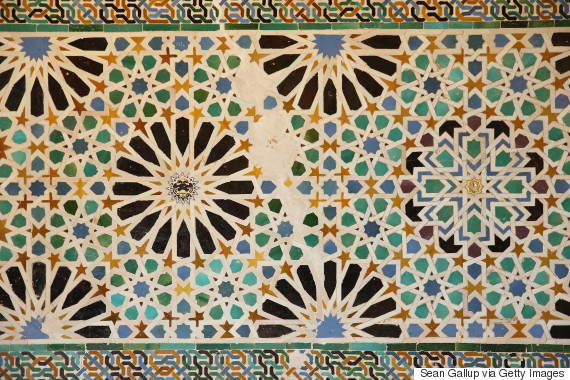
Intricate tile and mosaics decorates a room in the Nasrid Palaces at the Alhambra in Granada, Spain. Sean Gallup/Getty Images.A small military contingent landed on the southern coast of Spain in 711 in response to the pleadings of the Jewish community, which faced harsh persecution under the Visigoth rulers. The arrival of the Muslims and their victory prevented what New York University Professor David Levering Lewis terms "the final solution." Christian leaders like Count Julian, whose daughter had been dishonored at court, had also been requesting Muslim intervention. It is precisely this reason, the support of large sections of local society, that allowed the Muslims to so easily establish their domination over Al-Andalus.
2. By describing Muslims as "backward", "retarded" and "barbaric," it is suggested that they are not capable of balancing their religion with rational thought. Yet Muslims had already attained a balance between the two positions centuries before other European societies.
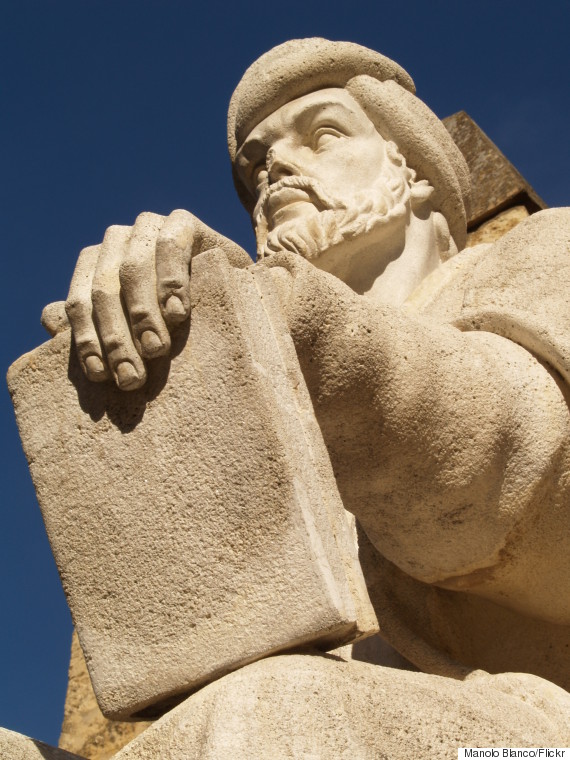
Monument of Averroës, Manolo Blanco/Flickr.The debate between faith and reason that had been agitating Muslim philosophers and had begun since the birth of Islam and its first encounters with Greek philosophy found one of its most sophisticated votaries in Ibn Rushd, or Averroës, in 12th century Andalusia. Averroës' translations and commentaries on Aristotle and Plato so influenced scholars like Thomas Aquinas that he and others across Europe, assuming his name needed no elaboration, referred to Ibn Rushd simply as "The Commentator."
3. The first man ever to fly was the scholar Ibn Firnas near Cordoba in the 9th century.
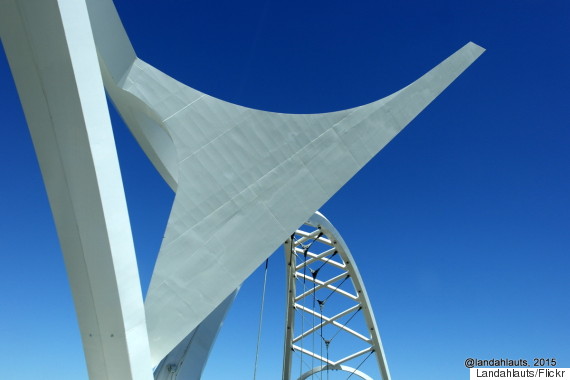
The Ibn Firnas bridge, Landahlauts/Flickr.An inventor, engineer and poet, he is credited for designing a water-clock,manufacturing colorless glass and making magnifying corrective lenses or "reading stones." One of the main bridges of Cordoba -- constructed in the form of gigantic wings -- is named in honor of his flight, as is an airport in Baghdad and a crater on the moon.
4. Cordoba, in Andalusia, was the most populous and glittering city of Europe in the 10th century.

Circa 1955: In the old Moorish quarter of Cordoba the cathedral is visible at the end of a cobbled street. Three Lions/Getty Images.Its streets were lit and there were baths, gardens and libraries everywhere. The main library was estimated to have 400,000 books when the largest library in Europe,... Visitors came from all over the continent to marvel at Andalusian civilization, and a nun in Saxony called Hroswitha described it as ''the ornament of the world.''
5. Islam is frequently accused of being intolerant and rejecting harmony with other cultures and religions. Yet Muslim Spain or Andalusian civilization offers one of the most shining examples of harmony, peace and prosperity between different religions in the history of Europe.
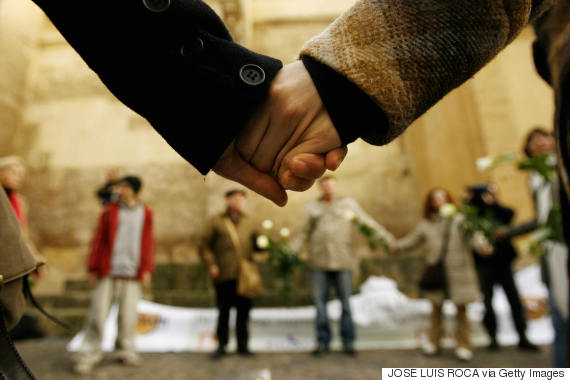
People pray during an interreligious prayer outside the great mosque in Cordoba. JOSE LUIS ROCA/AFP/Getty Images.At one point the capacity of people of different faiths to live and work together in Andalusia was illustrated by its ruler Abd Al-Rahman III in the 10th century. His chief minister was Jewish and his ambassador to the Holy Roman Emperor Otto I was the Catholic Bishop Racemundo. The Spanish term La Convivencia or Coexistence describes that time in Al-Andalus. Harmony at the political level engendered creativity and prosperity. Others saw it differently. Muslim tribes fresh from the deserts and mountains of North Africa looked on Andalusian society as decadent and corrupt. They destroyed Madina-at-Zahra, the beautiful royal town built in the hills near Cordoba considered the gem of Andalusian architecture. Scholars like the great Rabbi Maimonides and Averroës were forced into exile from their beloved Cordoba.
6. Two of the greatest novels of Western literature directly or indirectly bear the mark of Islamic culture. "Don Quixote" and "Robinson Crusoe" were selected by experts and critics as the number one and three respectively on the Guardian's list of "The 100 Greatest Novels of All Time."
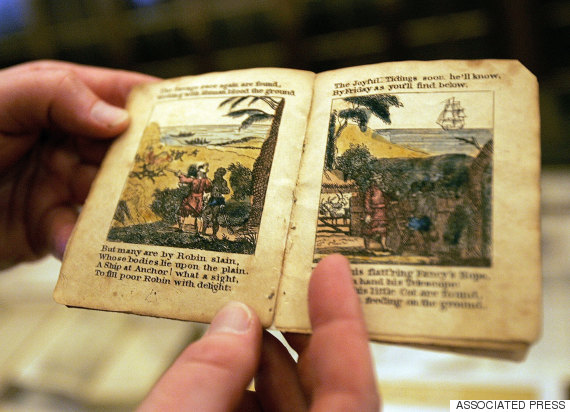
Earle Havens, acting keeper of Rare Books and Manuscripts of Boston Public Library, holds an 1824 children's chapbook of "Robinson Crusoe." AP Photo/Chitose Suzuki.In the first, Cervantes began his novel by disclosing, with tongue in cheek, that it was a manuscript written by an Arab called Cide Hamete Benengeli or Sir Hamid Aubergine. The theme and structure of the 12th century novel "Hayy ibn Yaqdhan" (English translations were published from a Latin version in 1686 and the original Arabic in 1708) by the Andalusian philosopher Ibn Tufail about a man stranded on an desert island with a companion, no female company and engaged in raising philosophical questions about the nature of society, fores...Daniel Defoe's "Robinson Crusoe" (first published in 1719). In fact, the influence of "Hayy ibn Yaqdhan" on Europe was so great it "could be considered one of the most important books that heralded the Scientific Revolution."
7. Two of the most celebrated European rulers, Roger II, the king of Sicily, and Frederick II, the holy Roman emperor, were so influenced by Islamic culture that they spoke Arabic, had Muslim bodyguards and inscriptions in Arabic were written on their royal ceremonial mantle, which was wornby the holy Roman emperors at their coronations until the late 18th century.
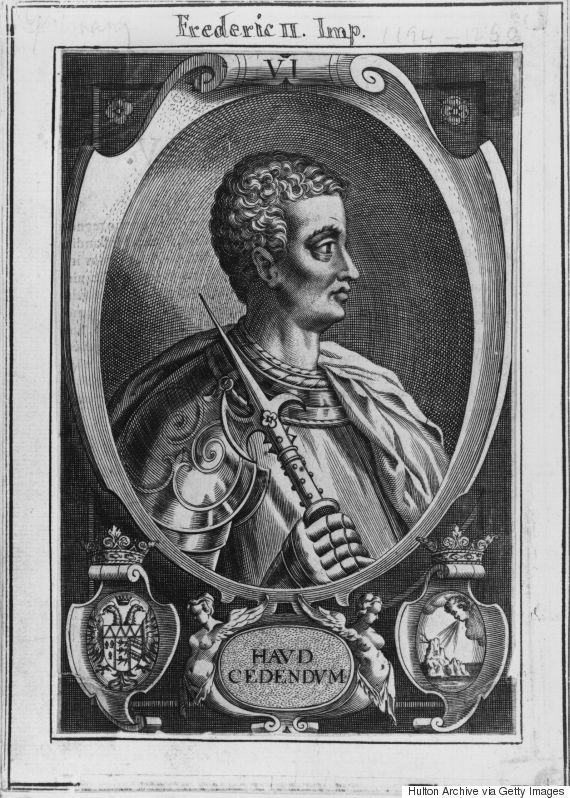
Circa 1230, Holy Roman Emperor Frederick II (1194 - 1250) of Germany. Photo by Hulton Archive/Getty Images.Roger used Islamic designs and calligraphy to decorate his greatest project, the Palatine chapel in Palermo, which can be seen today. Frederick II admired Averroës so much that he sent translations of Averroës' work to European universities so that they could be studied and taught. Frederick II illustrated how a spectacular geopolitical victory can be gained without warfare and bloodshed when he washanded over Jerusalem peacefully during the Sixth Crusade by the sultan of Egypt due to the mutual respect they had for one another. In the case of Roger and Frederick, we see the Andalusian La Convivencia in reverse: Christian rulers accepting and appreciating their Jewish and Muslim subjects.
8. Johann Wolfgang von Goethe, considered the greatest of poets in the German language, wrote a powerful poem dedicated to the prophet of Islam.
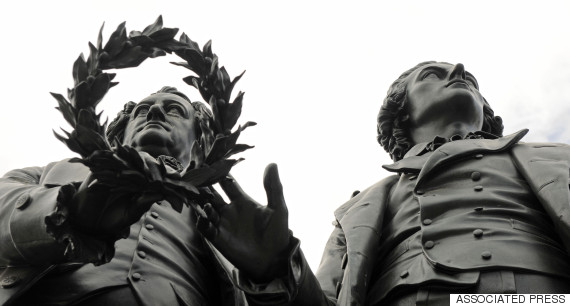
The memorial of revered German poets Johann Wolfgang von Goethe, and Friedrich Schiller, right, is seen in Weimar. AP Photo/Jens Meyer.He made the enigmatic comment that expressed his admiration for Islam: "In Islam, we all live and die."
9. Napoleon in Egypt wore Arab dress, emphasized his respect for Islamand declared that he and the French were Muslim.
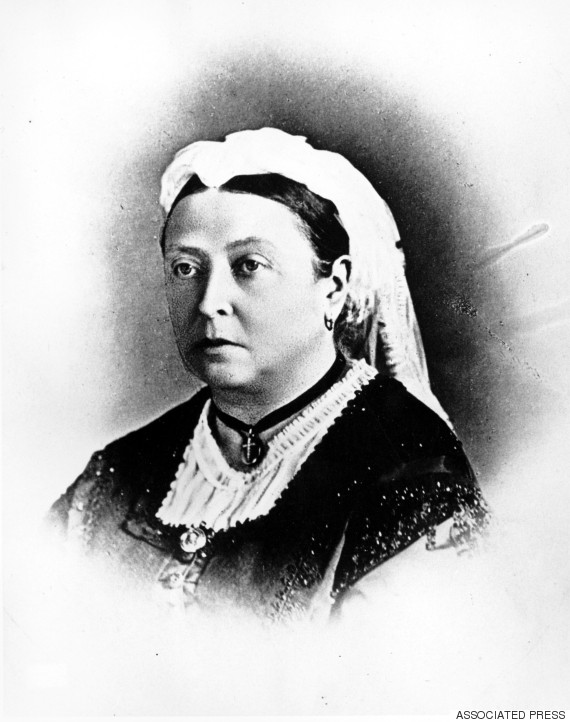
An 1879 portrait of Queen Victoria. AP Photo.Queen Victoria called her personal assistant, Muhamma Abdul Karim, an Indian Muslim, her munshi, a term meaning teacher. Abdul Karim was so close to her that the relationship roused the envy of the royal household. The last German emperor, Kaiser Wilhelm II, prided himself on the title "Hajji," and declared he would be the p... against European imperialism.
10. More European women than men are converting to Islam in spite of the widespread antagonism to the religion.
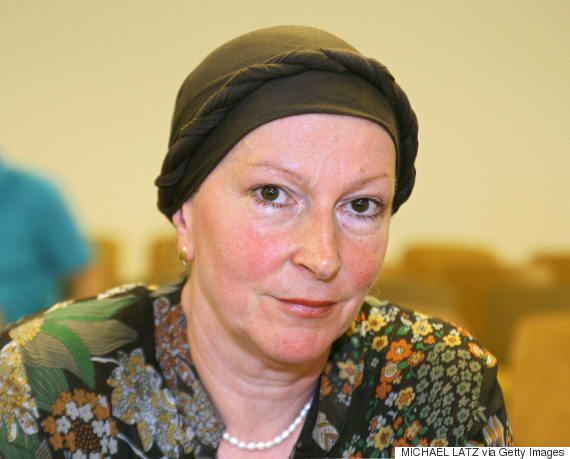
German teacher Doris Graber converted to Islam. MICHAEL LATZ/AFP/Getty Images.Despite the perceived mistreatment of women in Muslim communities and the rising tide of aggressive secularism, they are finding solace and peace in Islam.
* * *
Today, too, Muslims are also making an impact -- and it is not all about the violence of the Islamic State and the thousands who have left to join them. Thirteen Muslim members of parliament have been elected in the recent elections in the U.K. Eight of them are women. Muslims are currently serving as government ministers in the U.K.
There has been a captain with a Muslim background of the English cricket team, and there are many Muslims in the top European football clubs and on European national... Malala Yousafzai, who is originally from Pakistan, won the Nobel Peace Prize and now lives in the U.K. She is an internationally known activist for female education, now challenging Boko Haram for its attitude towards girls and pleading with the United Nations for more support for women.In the discussions of Islam that focus on acts of Muslim violence, such as those associated with the Islamic State, and provide fuel against Muslim immigrants from Africa and Asia, it is often overlooked that there are millions of indigenous Europeans such as Bosniaks, Albanians and Pomaks who are also Muslims. These indigenous Muslims form the majority population in Albania, Kosovo and Bosnia-Herzegovina. Europe, therefore, has its own native population, which happens to be Muslim. These Balkan Muslims, like other Europeans, are committed to democracy, prosperity, education and the ability to live with people of different cultures and religions.
As the debate around Islam continues to create controversy, anger and even violence, the "surprises" presented here may help to put the nature of Islamic civilization in its proper context. These are facts that would benefit not only non-Muslims but also Muslims. The critics of Islam, as much as those who advocate violence on its behalf -- groups like Islamic State, for example -- need to appreciate the cultural and intellectual sophistication of Muslim civilization when it was widely acknowledged as the most advanced in Europe. The destruction by the Islamic State of the ancient history of the Middle East, such as at Nimrud, and attacks on minorities are emblematic of their character. It is also an explicit rejection of the rich Muslim civilization that gloried in cultural, intellectual and philosophic sophistication. Muslims had achieved that reputation for a period of time because society offered its individuals, regardless of religion or race, the possibility of pursuing knowledge and working together to produce peace and prosperity.
I am not advocating a return to the past for a moment. I am merely suggesting that there are lessons in history for us, if only we are prepared to think about and learn from them.
http://www.huffingtonpost.com/akbar-ahmed/right-wing-europeans-isla...
-
Comment by Riaz Haq on January 19, 2021 at 7:41am
-
“For centuries before the early modern era, the intellectual centers of excellence of the world, the Oxfords and Cambridges, the Harvards and Yales, were not located in Europe or the west, but in Baghdad and Balkh, Bukhara and Samarkand,” the British historian Peter Frankopan wrote in “The Silk Roads: A New History of the World.”
https://www.nytimes.com/2021/01/16/opinion/walk-across-world-americ...
-
Comment by Riaz Haq on December 4, 2022 at 5:01pm
-
Why India failed to produce a Second CV Raman?
Jul 5, 2022 — Reasons for the failure of Indians to win Nobel Prize after RAMAN are discussed. ...Richard Dawkins has gone so far, he's lost even his atheist friends
Mr Dawkins’s unwillingness to treat anyone who disagrees with him as though they had even half a functioning brain cell is putting off even his own supporters.Most British scientists cited in study feel Richard Dawkins misrepresents science
Oct 31, 2016 — Controversial British evolutionary biologist Richard Dawkins is well-known for his criticism of religion, but a new Rice University study of British scientists reveals that a majority who mentioned Dawkins’ work during research interviews reject his approach to public engagement and said his work misrepresents science and scientists because he conveys the wrong impression about what science can do and the norms that scientists observe in their work.
-
Comment by Riaz Haq on December 5, 2022 at 7:08am
-
Via email from Virginia Raine:
How 'Pepe the Frog' went from harmless to hate symbol
https://www.latimes.com/politics/la-na-pol-pepe-the-frog-hate-symbo...
Oct 11, 2016 — The darker corners of the Internet turned a cartoon frog into a hate symbol.
Godless grifters: How the New Atheists merged with the far right
https://www.salon.com/2021/06/05/how-the-new-atheists-merged-with-t...
Jun 5, 2021 — I remember watching clip after clip of Sam Harris, Richard Dawkins and Christopher Hitchens debating Christians, Muslims and "purveyors of woo," ...
What happened to Richard Dawkins? - Overland literary journal
https://overland.org.au/2020/02/what-happened-to-richard-dawkins/
Feb 18, 2020 — What happened to Richard Dawkins? How did an acclaimed scientist and public intellectual transform himself into the dreary boor regularly popping up in your social media feed with yet another drunken uncle tweet about gender or race?
Dawkins, you might say, has aged like milk, except that’s not exactly true. As a matter of fact, he’s always been like that. He’s not the one who has changed – the world has.
The New Atheism Dawkins helped forge related to philosophy rather as Nu Metal pertained to music. In retrospect, they’re preposterous and embarrassing but, in their day, both presented themselves as cutting edge, even progressive.
How the toxic went mainstream - Pursuit
https://pursuit.unimelb.edu.au/articles/how-the-toxic-went-mainstream
Aug 21, 2019 — By adept use of social media, including memes, far-right and white supremacist ideologies are gaining currency and making extremist and divisive language part of everyday life.
The White Meme's Burden - jstor
https://www.jstor.org/stable/10.5325/reception.10.1.0050
by L Jeffries · 2018 — alt-right, white supremacists, Internet memes, Ben Tillman ... biologist Richard Dawkins created the term in his 1976 book The Selfish Gene,.
The “Great Meme War:” the Alt-Right and its Multifarious Enemies
https://journals.openedition.org/angles/369
by M Dafaure · 2020 — In this essay, I discuss how the alt-right has brought back into fashion traditional tenets of the reactionary, xenophobic, and often racist far-right, as demonstrated by George Hawley, and how it has managed to make these tenets appear as novel, provocative, and updated to the 21st century U.S. society and digital environment. I argue that to do so, alt-righters relied heavily on the creation, and sometimes reappropriation, of enemy images, with the ultimate goals of provoking outrage, instilling fear and/or hatred towards specific groups, reinforcing a sense of belonging within their own community, or more broadly manipulating collective perceptions and representations, first online then in real life. Indeed, the election of Donald Trump was hailed by the online alt-right as one of their major successes. With the help of irony, subversion, and often carefully engineered propaganda-like messages and images, the alt-right, it boasts, “meme’d into office” the Republican candidate. This paper consequently leads to an analysis of real-life repercussions of such adversarial rhetoric, notably through examples of recent far-right domestic terrorism in the US, and to a reflection on their place in an age of post-truth, fake news, and alternative facts.
The Alt-Right: The Rise of Internet Demagogues
https://thecolgatemaroonnews.com/2093/commentary/the-alt-right-the-...
-
Comment by Riaz Haq on December 5, 2022 at 7:23am
-
Is Richard Dawkins destroying his reputation? - The Guardian
Jun 9, 2015 — The scientist and bestselling writer has become the face of a new crusading atheism. But even his closest allies worry that his online provocations do more harm than goodThe New Statesman on Twitter: "The closed mind of Richard Dawkins
The closed mind of Richard Dawkins - his atheism is its own kind of narrow religion, writes John Gray. newstatesman.com.The Atheist Movement Needs to Disown Richard Dawkins
https://www.vice.com/en/article/jmbayk/the-atheist-movement-needs-t...
Sep 17, 2014 — Atheist author, biologist, pioneer of the term "meme," and noted sexist curmudgeon Richard Dawkins let fly a firestorm of tweets about rape this past Friday. Those, along with his statements from the past couple of years about this and other issues, make for pretty strong evidence that Dawkins is no longer the figuredhead the atheist movement needs or deserves.Never tweet, Richard Dawkins: Famed atheist now signal ...
Feb 1, 2016 — Never tweet, Richard Dawkins: Famed atheist now signal-boosting Nazi propaganda. Dawkins keeps demonstrating that there's no tweet too low ... Famed atheist and of-late-anti-PC crusader Richard Dawkins is again in hot water ... In carelessly pushing white supremacist propaganda, ...Richard Dawkins has become a overrated cultural ... - Reddit
Aug 26, 2021 — Richard Dawkins has become a overrated cultural commentators who's views on religion are shown to be shallow.
-
Comment by Riaz Haq on December 5, 2022 at 7:30am
-
The Atheist Movement Needs to Disown Richard Dawkins
Increasingly, Dawkins only makes headlines by provoking outrage over his handling of sexism, racism, and pedophilia, instead of his thoughts on biology. It's time for his followers to take away his megaphone and hand it to someone who's on message.https://www.vice.com/en/article/jmbayk/the-atheist-movement-needs-t...
Followers of Dawkins’s antics may remember the 2011 scandal wherein Rebecca Watson, founder of female-focused atheist site Skepchick, asked men to refrain from hitting on her while in an elevator because it made her uncomfortable. Her request, tragically, caused Dawkins to lose his mind. He posted a sarcastic letter to “Muslima,” a fictional Muslim woman, telling her to “stop whining” about how hard she has it as a Muslim woman. Dawkins later apologized, albeit snidely.
The “Muslima” incident wasn't his only brush with Islamophobia. Dawkins arguably dislikes Islam even more than he dislikes false accusations of rape. (Let’s just hope he never catches wind of a Muslim person pursuing a rape allegation.) Dawkins tweets about his disdain for Islam—excuse me, the objectively correct “fact” that Islam is wrong—several times a day. On Twitter, he’s taken potshots at Muslims for not having enough Nobel Prizes (take that!), and compared Islam to Nazism.Outside of Twitter, Dawkins has stated that he “[regards] Islam as one of the great evils of the world.” Once again, this is not the provocative, fresh opinion Dawkins obviously thinks it is. It’s a boring, conservative opinion espoused by millions of people who want an easy answer to the question of why bad things happen in the world. “Islam is bad” is the opinion of a cable-news pundit whose videos your conservative dad constantly forwards you in emails with the subject line "FWD: FWD: fwd: FINALLY SOMEONE IS NOT AFRAID TO SAY IT!!!"
Dawkins appears to have adopted the sexism and other forms of narrow-mindeness he purports to hate in religion (plus bonus defenses of pedophilia), proving his own mantras wrong with every new opinion he posts. Read Dawkins’s Twitter at any time for tweets about “objective reality” interspersed with paranoid tweets about Islam, and of course his regularly scheduled uninformed opinions on rape culture. Although he is gradually losing sympathizers, the so-called “new atheist” movement still holds him in too heroic a light. In his time, Dawkins did groundbreaking work in the field of biology, but his relevance—especially in social matters—is fading quickly. If the new atheist movement wants to move beyond outdated idols preaching old-fashioned discrimination, they need to disown Dawkins—or, at the very least, subtract themselves from his more than 1 million Twitter followers.
Comment
Twitter Feed
Live Traffic Feed
Sponsored Links
South Asia Investor Review
Investor Information Blog
Haq's Musings
Riaz Haq's Current Affairs Blog
Please Bookmark This Page!
Blog Posts
Pakistani Student Enrollment in US Universities Hits All Time High
Pakistani student enrollment in America's institutions of higher learning rose 16% last year, outpacing the record 12% growth in the number of international students hosted by the country. This puts Pakistan among eight sources in the top 20 countries with the largest increases in US enrollment. India saw the biggest increase at 35%, followed by Ghana 32%, Bangladesh and…
ContinuePosted by Riaz Haq on April 1, 2024 at 5:00pm
Agriculture, Caste, Religion and Happiness in South Asia
Pakistan's agriculture sector GDP grew at a rate of 5.2% in the October-December 2023 quarter, according to the government figures. This is a rare bright spot in the overall national economy that showed just 1% growth during the quarter. Strong performance of the farm sector gives the much needed boost for about …
ContinuePosted by Riaz Haq on March 29, 2024 at 8:00pm
© 2024 Created by Riaz Haq.
Powered by
![]()


You need to be a member of PakAlumni Worldwide: The Global Social Network to add comments!
Join PakAlumni Worldwide: The Global Social Network